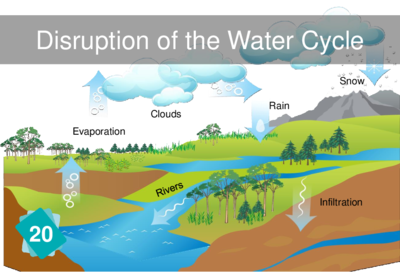En-en adult card 20 disruption water cycle
Card #20: Disruption Water Cycle
| Causes | Consequences | |

|
If the oceans and the atmosphere are hotter, the evaporation that takes place at the ocean surface increases.
This means more rain clouds and more rain. If this happens on land, then the soils dries out.
Explanation
This card is important. It alone shows why we used to talk about global warming and now about climate change.
Temperature increase is in itself a problem, but you can see on the collage at the end that disruption of the water cycle has much more effect.
Facilitation advice
To illustrate that evaporation takes place at the surface of the water, place cards 17 and 21 on the table, place the lower edge of card 21 against the upper edge of card 17, then place card 20 at the boundary of the two, perpendicularly, to mark the surface of the water (between water and air).
Correction
Causes
Consequences
Other possible links
Other causes
- Deforestation Vegetation retains water. When it is cut down, the risk of flooding increases.
Other consequences
- Melting of ice sheets It's a bit technical, but the blue part of the map of Antarctica on card 19 represents a gain in mass due to an increase of precipitations. The red part represents a loss in mass. In total, Antarctica is losing mass.
- Vectors of disease The Vectors of disease card is generally linked to the Terrestrial Biodiversity card because disease vectors are a sub-part of biodiversity, but it can also be linked to the same causes as the biodiversity card, i.e. Disruption of the Water Cycle and Temperature Rise.
Wrong links
Wrong causes
- Melting of Sea Ice The melting of the Arctic ice pack, but also the melting of Greenland's glaciers may lead, in the distant future, to a disruption of the thermohaline circulation (which gives rise to the Gulf Stream). But the "Water Cycle" card does not refer at all to the thermohaline circulation.
Wrong consequences
- Sea level rise No, more rain is not going to cause the oceans to overflow! This is a rare mistake to be made, but if it happens to you, ask the players where rainclouds come from...
To go further
El Niño
Explanatory video from OCE on El Niño
Popularisation
The Mystery of the Expansion of the Tropics (French)